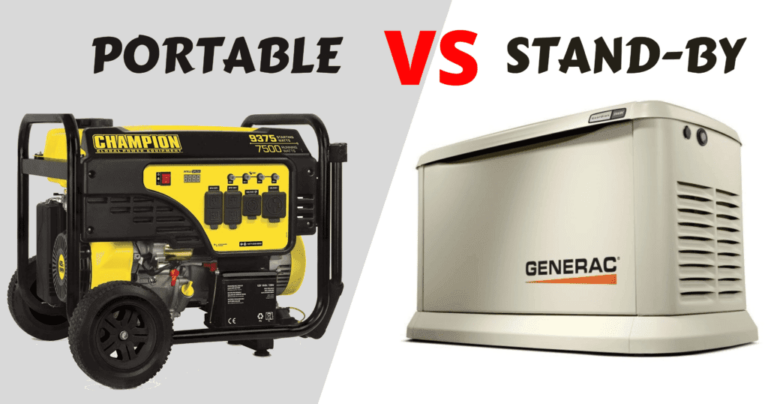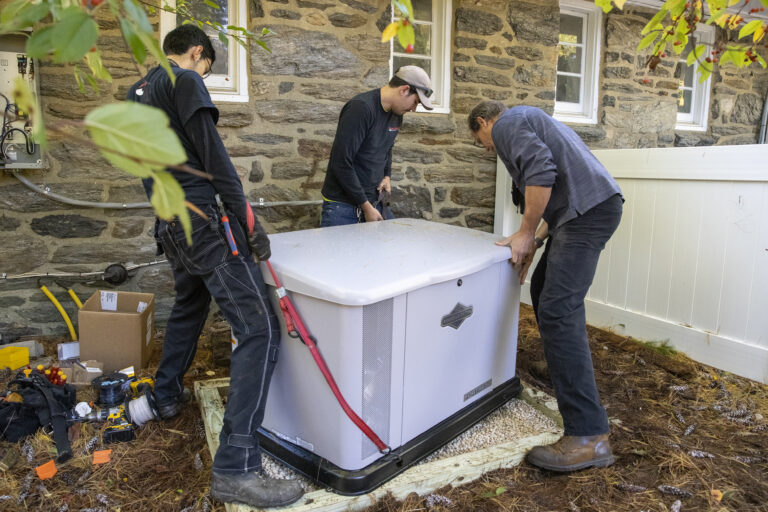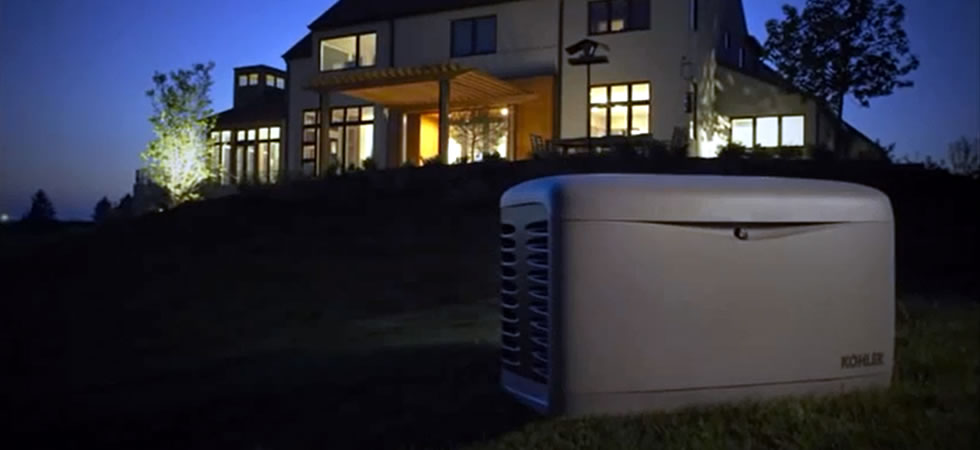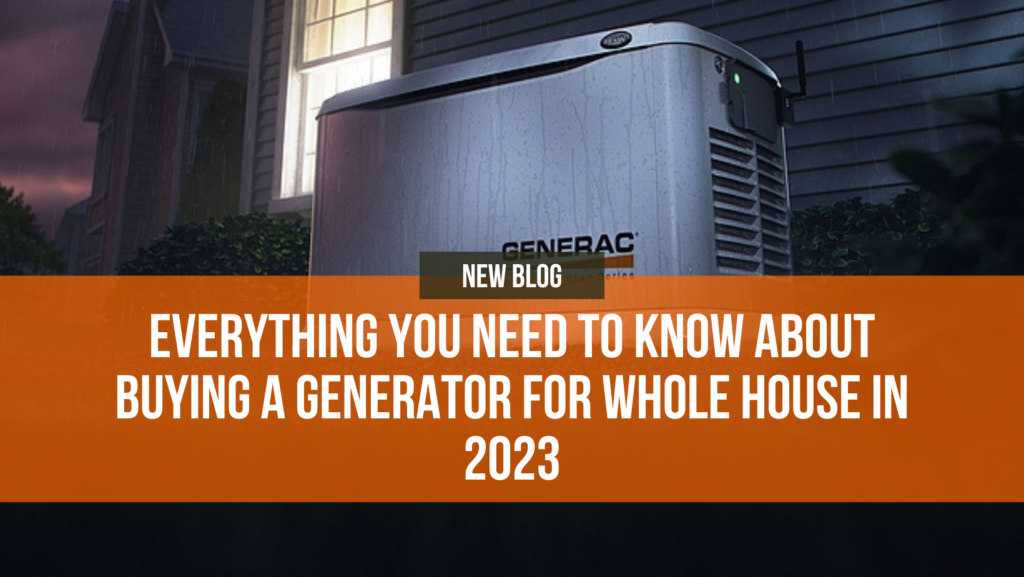When considering a whole-house generator, it’s important to look at all factors involved. Power outages can cause major disruptions in the home, but having a generator for your entire house allows you to keep appliances and lights running even during an outage. In this post, we will consider what types of generators are available, things to think about when selecting one, installation/maintenance costs and potential benefits or drawbacks associated with investing in such an item so that by the end, you have everything needed to make smart decisions around whole-house generators!
Short Summary
- Understand the differences between standby and portable generators when selecting a whole-house generator.
- Consider factors such as power output, fuel type, noise level and installation process before making your decision.
- Investing in a whole-house generator offers numerous benefits, including convenience, safety and increased home resale value.

Types of Whole-House Generators
Whole-house generators come in two main forms: standby and portable. It is important to understand the distinctions between them as this will determine which type of generator best suits your power requirements for backup. We’ll look at their characteristics, advantages, and disadvantages closer below. House generators must be chosen carefully depending on one’s energy needs; both types provide a reliable source of electrical supply but with varying outcomes regarding whole-house coverage or portability options.
Standby Generators
Standby generators are highly beneficial. To portable ones due to their automatic activation, larger power output capability and the fact that they can be linked up directly with natural gas lines. Of course, this comes at a higher cost, including professional installation fees and meeting local regulations regarding connecting the generator to a nearby fuel source (gas). For instance, you must have a transfer switch installed to connect to your home’s electrical system and possibly acquire battery backup for any sump pumps present.
Before deciding if standby generators should suit you best, it is crucial to thoroughly consider what costs would come along and weigh them against their benefits.
Portable Generators
Standby generators are more expensive and bulkier than their portable counterparts. Portable generators run on either gasoline, diesel, or propane fuel sources and can be used for shorter power outages. They must be manually operated, making them less powerful than standby varieties.
An example of a lightweight generator is the Westinghouse Dual Fuel natural gas unit, which offers two household outlets plus two RV-ready receptacles along with a transfer switch function – 12 hours off of gas and 11 when using liquid propane tankage as its energy source. Before deciding upon any portable machine, it’s wise to assess what types of fuels exist near you because each one presents unique perks or drawbacks before use.

Factors to Consider When Choosing a Whole-House Generator
When choosing a generator for your home, there are many things to consider, such as the power output, fuel type and noise level. In this article, we will look at each aspect in detail so you can make an informed decision when selecting a whole-house generator.
It’s essential to consider every factor carefully before deciding on one – from the total amount of energy it produces through its resources down to how noisy or quiet it is – making sure it meets your and your household’s needs. This guide will help ensure you pick the perfect fit for whatever use case you have in mind!
When choosing a whole-house generator, it is essential to consider its power capacity to make sure that the device will be able to generate enough energy for all of your appliances and devices during an outage. To assess this requirement correctly, you should have a professional total of the wattage used by everything connected in your home.
The suitable rating required might depend on your residence’s size and how many functions are needed. For small residences, 14-18kW might suffice, while 45-48kW may be better if you need more electricity running throughout an entire house.
Meticulously consider what type of resources must be supplied before deciding which kind of whole-house generator would best meet those needs.
When selecting a whole-house generator, one must consider what fuel sources are available in the area and how they will impact cost and performance. Whole-house generators can use natural gas, propane or diesel to power them. Natural gas is often connected directly to the home’s existing gas line making it an efficient option. Liquid propane offers more portability for areas without access to natural gas, while diesel requires increased maintenance but may be necessary if no other options are present. Dual fuel engines offer versatility with propane and natural gas as potential fuels, especially beneficial during national disasters when gasoline might become less accessible or expensive.
When selecting a whole-house generator, the noise level is an important point to consider. Noise can be bothersome and undesirable in residential areas, damaging your ears with constant loud noises. It’s essential to examine the possible sound output of the chosen model so that it does not disturb occupants or disrupt their environment too much. Fortunately, some options available on the market have additional features such as silent operation mode and noise-reducing designs that can help maintain peace within one’s home without sacrificing convenience or energy efficiency levels.
Installation Process and Costs
When considering purchasing and installing a whole-house generator, it is important to understand all involved costs and whether professional assistance will be required. Whether you decide on a standby or portable system for your home, knowing what’s involved can help ensure everything runs smoothly during setup.
The procedure for installing one of these generators may differ depending on which type is chosen. Knowing both options beforehand should facilitate making an informed decision that best suits your needs.
For those considering a whole-house generator, opting for professional installation is often best. Experienced professionals can ensure an effective and safe setup while advising on the type of unit most suitable for your needs.
Yet this comes at an added cost compared to doing it yourself. If opting for DIY, consider factors such as existing skills, available resources or possible risks linked with attempting the project independently to make an informed decision about what approach is right for you.
Extra costs should be considered when installing a whole-house generator, such as the price of laying down a concrete pad and procuring an ATS (Automatic Transfer Switch). Professional installation is also another necessary expense. You might need permits ranging from $50-$200 plus any electrical upgrade requirements needed for your project.
Considering all these expenses before starting with a home generator system, you can better plan how much money needs to be allocated, ensuring there’s enough in the budget when it’s time for installation.
Ready to find your Generator Dealer?
Maintenance and Running Costs
Whole-house generators require regular maintenance to ensure they operate efficiently and for an extended period of time. This includes checking the fuel type used and considering running costs associated with its use. Failure to carry out routine upkeep can lead to a decrease in performance, which may be costly in terms of repairs, so all aspects related must be tended to regularly. Keeping your whole-house generator well looked after will provide peace of mind knowing you have an appliance ready when needed; if correctly maintained from the start, minimal issues should arise throughout its lifetime, providing optimal output capability whenever necessary.
To guarantee optimal performance and extended service life of a whole-house generator, it is necessary to perform routine maintenance. This includes checking the oil level, fuel amount and air filter while inspecting for any damage or signs of wear. Operating your whole-house generator once or twice monthly can prevent potential future issues and ensure its lasting longevity. Keeping on top of this schedule will help you preserve the condition and productivity levels required by such an essential piece of machinery at home.
The suitable rating required might depend on your residence’s size and how many functions are needed. For small residences, 14-18kW might suffice, while 45-48kW may be better if you need more electricity running throughout an entire house.
Meticulously consider what type of resources must be supplied before deciding which kind of whole-house generator would best meet those needs.
Natural gas is the most economical fuel source for whole-house generators in terms of power and cost. Propane may not be as efficient as natural gas, but it still provides a reliable option that won’t break your budget. Diesel requires more fuel to generate equal energy, so it should only be considered when necessary.
To increase efficiency and keep running costs down, select a generator size suited to your needs, choose from one of the three suggested fuels wisely and adhere strictly to any applicable maintenance schedule. Using power-saving appliances or devices could also help reduce overall consumption, resulting in lower expenses around these types of generators.
Benefits of Investing in a Whole-House Generator
A whole-house generator is an invaluable investment providing homeowners with numerous benefits, such as increased home resale value and convenience. When power outages become extended or occur regularly, the generator will ensure your home remains powered without disruption. It automatically activates in these cases to supply energy throughout every area of the property.
Safety advantages include a low risk of electric shock due to its well-enclosed design and cooler operation, which also helps reduce potential carbon monoxide poisoning threats compared to traditional generators. Vital medical equipment can remain operational during blackouts, making this system beneficial for those needing round-the-clock care at their residence.
For business owners with essential work tools set up in their homes (such as computers), having a backup source eliminates any downtime from occurring should there be multiple periods where electricity gets cut off, thus allowing them income continuity even under demanding circumstances. To sum it up, Investing in a whole-house generator delivers comfortability, security reassurance, and great financial rewards while keeping day-to-day operations reliable despite power disruptions!

Potential Drawbacks and Challenges
When choosing a whole-house generator, weighing the potential benefits and challenges of such an investment is important. Several risks associated with installation could cause fire or explosion due to incorrect plumbing connections. Site selection for your generator must be well thought out to prevent exhaust from entering the home while still considering wind direction. Space needs and environmental issues should also be considered when selecting a unit, as larger models may require more room than smaller ones and produce increased noise levels.
Nevertheless, these drawbacks can often pale in comparison. Owning a backup power source during those dreaded power outages makes investing in one’s whole-house generator highly worthwhile!
Summary
A whole-house generator can bring many advantages, such as convenience, security and the potential to increase home resale value. Carefully considering aspects like power capacity, fuel type, and noise level while being aware of installation and maintenance costs is essential when choosing this kind of backup power source for your property. Though there may be some difficulties associated with purchasing one, these generators will provide peace of mind during any eventuality caused by unexpected outages or shortages in energy supply.
Power Up & Get Your Whole-House Generator Today
Frequently Asked Questions
When a power outage strikes, having a 5,000-8,000 watts generator can be extremely useful in keeping your household running. It can power appliances such as an air conditioner and sump pump essential for everyday life. The device could provide juice to other devices like laptops or TVs when needed or even outdoor events such as camping trips. Plus, it will give light where ever you need providing energy to bulbs too!
To keep all essential appliances operational in your 2000 sq ft home, you’ll require a generator to generate 5000 watts of AC power.
Installing a Generac generator in an average 2000-square-foot home can range from $6,500 to over $10,900. This depends on the power output and size requirements for that particular house. On average, the average is 20. It typically comes up to around 8700 dollars in total.
When choosing a generator for backup power, an Automatic Transfer Switch rated at 100-Amp load center should suffice for a 2500 square-foot house. A 20kW – 25kw generator can provide sufficient energy to keep essential appliances running during blackouts, such as air conditioners, furnaces and fridges. This site can support any other needs you may have while the electricity is out.
Standby generators offer strong power output and are connected to natural gas lines, allowing them to work automatically. They tend to be larger than portable generators that require manual operation but can run on gasoline, diesel or propane at a lower cost.


